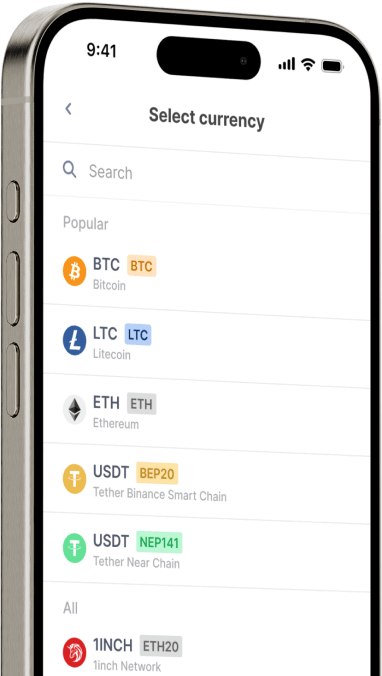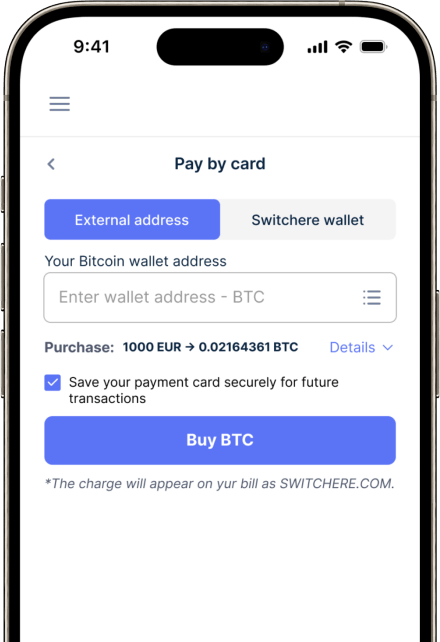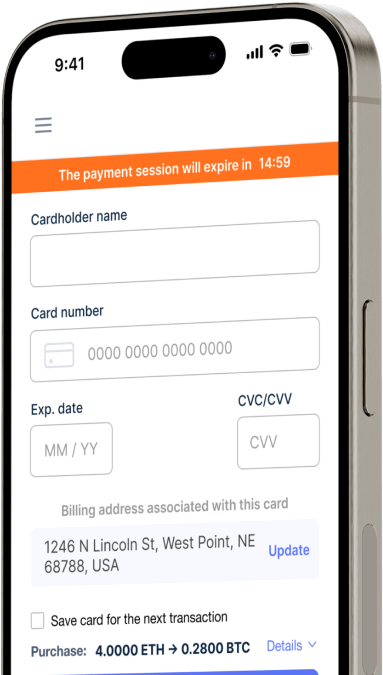Convertir
Danish Krone (DKK) a Binance USD (BUSD) al instante
Compre Binance USD (BUSD) con Danish Krone (DKK) fácilmente en Switchere y benefíciese de transacciones rápidas y seguras.
Acerca de
Binance USD (BUSD)
BUSD (BUSDBSC) es una stablecoin regulada, respaldada por fiat y vinculada 1:1 al dólar estadounidense, diseñada para proporcionar estabilidad de precios en el volátil panorama de los activos digitales. Emitida por Paxos Trust Company en colaboración con Binance, BUSD pretende ofrecer un medio de intercambio y un depósito de valor fiables. El ticker "BUSDBSC" denota específicamente su presencia como un token BEP-20 en la cadena inteligente BNB, una red descentralizada de alto rendimiento que facilita amplias aplicaciones DeFi. La tecnología básica de BUSD se basa en reservas transparentes y auditadas de dólares estadounidenses en cuentas específicas, lo que garantiza que cada token está respaldado por una cantidad equivalente de moneda fiduciaria. Esto contrasta con las stablecoins algorítmicas, que ofrecen un enfoque diferente para mantener su vinculación y seguridad criptográfica.
La principal utilidad de BUSD, en particular de su variante BUSDBSC, es permitir transacciones fluidas y la participación en el ecosistema de la cadena BNB con un riesgo de precio mínimo. Su tokenómica es sencilla: se acuñan nuevos BUSD cuando se depositan dólares en Paxos, y se queman cuando se canjean, manteniendo el respaldo 1:1. Entre los casos de uso más destacados se incluyen la negociación contra otras criptomonedas en bolsas como PancakeSwap, servir como garantía en protocolos de préstamos y empréstitos, la agricultura de rendimiento dentro de varias aplicaciones DeFi y facilitar los pagos entre pares. Como stablecoin aprobada por el NYDFS (para la versión de Ethereum emitida por Paxos) y ampliamente adoptada, BUSD desempeña un papel importante a la hora de proporcionar liquidez y una representación digital del dólar fiable y conforme en diversas plataformas de tecnología blockchain, actuando como elemento fundamental para muchas infraestructuras Web3 y actividades financieras en cadena.
Comprar otras 150+ criptomonedas por Danish Krone (DKK)
Otras monedas para Danish Krone (DKK)
-
DKK a ZRX
-
DKK a 1INCH
-
DKK a AAVE
-
DKK a ACH
-
DKK a ALGO
-
DKK a TLM
-
DKK a ANKR
-
DKK a APE
-
DKK a NFT
-
DKK a API3
-
DKK a APT
-
DKK a ARPA
-
DKK a AUDIO
-
DKK a AVAX
-
DKK a AVAX
-
DKK a AXS
-
DKK a BADGER
-
DKK a BAL
-
DKK a BNT
-
DKK a BAT
-
DKK a BNB
-
DKK a BUSD
-
DKK a BSW
-
DKK a BSV
-
DKK a BLUR
-
DKK a BONE
-
DKK a CTSI
-
DKK a CELR
-
DKK a CELO
-
DKK a CEL
-
DKK a LINK
-
DKK a CHZ
-
DKK a CHR
-
DKK a C98
-
DKK a COMP
-
DKK a CFX
-
DKK a PEOPLE
-
DKK a CVX
-
DKK a ATOM
-
DKK a CTC
-
DKK a CRV
-
DKK a DAI
-
DKK a DASH
-
DKK a MANA
-
DKK a DENT
-
DKK a DGB
-
DKK a LEASH
-
DKK a DYDX
-
DKK a XEC
-
DKK a EOS
-
DKK a ETC
-
DKK a ENS
-
DKK a ETHW
-
DKK a FET
-
DKK a FIL
-
DKK a FLOKI
-
DKK a GALA
-
DKK a GNO
-
DKK a ONE
-
DKK a HBAR
-
DKK a HOT
-
DKK a HOOK
-
DKK a ICX
-
DKK a ILV
-
DKK a IMX
-
DKK a INJ
-
DKK a ICP
-
DKK a IOST
-
DKK a IOTX
-
DKK a JASMY
-
DKK a JST
-
DKK a KAVA
-
DKK a KCS
-
DKK a KSM
-
DKK a KNC
-
DKK a LDO
-
DKK a LQTY
-
DKK a LPT
-
DKK a LOOKS
-
DKK a LRC
-
DKK a LUNA
-
DKK a MKR
-
DKK a MASK
-
DKK a EGLD
-
DKK a ALICE
-
DKK a NEAR
-
DKK a XEM
-
DKK a NEXO
-
DKK a NOT
-
DKK a NMR
-
DKK a OKB
-
DKK a OMG
-
DKK a ONT
-
DKK a EDU
-
DKK a OP
-
DKK a OGN
-
DKK a CAKE
-
DKK a PAXG
-
DKK a PENDLE
-
DKK a DOT
-
DKK a POL
-
DKK a QTUM
-
DKK a QNT
-
DKK a RDNT
-
DKK a XRD
-
DKK a RVN
-
DKK a REN
-
DKK a RSR
-
DKK a RLC
-
DKK a RPL
-
DKK a SFP
-
DKK a SHIB
-
DKK a SKL
-
DKK a SXP
-
DKK a STND
-
DKK a STG
-
DKK a XLM
-
DKK a GMT
-
DKK a STORJ
-
DKK a STMX
-
DKK a SUSHI
-
DKK a SNX
-
DKK a USDT (NEP141)
-
DKK a USDT (FA2)
-
DKK a USDT (TRC20)
-
DKK a USDT (JETTON)
-
DKK a USDT (SPL)
-
DKK a USDT (ERC20)
-
DKK a USDT (AVAC)
-
DKK a USDT (BEP20)
-
DKK a USDT (Polygon)
-
DKK a XTZ
-
DKK a GRT
-
DKK a SAND
-
DKK a TFUEL
-
DKK a THETA
-
DKK a RUNE
-
DKK a TON
-
DKK a TUSD (BEP20)
-
DKK a TUSD (TRC20)
-
DKK a TWT
-
DKK a UOS
-
DKK a UMA
-
DKK a UNI
-
DKK a USDC (SPL)
-
DKK a USDC (Polygon)
-
DKK a USDC (OP)
-
DKK a USDC (TRC20)
-
DKK a USDC (BEP20)
-
DKK a USDC (BEP20)
-
DKK a USDC (AVAC)
-
DKK a USDC (ARB)
-
DKK a USDC (ERC20)
-
DKK a VET
-
DKK a VRA
-
DKK a WAXP
-
DKK a WOO
-
DKK a WLD
-
DKK a WBTC
-
DKK a WMINIMA
-
DKK a XDC
-
DKK a YFI
-
DKK a YGG
-
DKK a ZIL
Cómo comprar Binance USD (BUSD)
Preguntas frecuentes
-
¿Qué es el par de trading DKK a BUSD y por qué es significativo?
El par DKK/BUSD representa el tipo de cambio entre la corona danesa (DKK), una moneda fiduciaria, y Binance USD (BUSD), una stablecoin regulada vinculada 1:1 al dólar estadounidense. Su importancia radica en proporcionar una rampa de entrada de fiat directa para los usuarios daneses al ecosistema de Binance y al espacio DeFi más amplio. Esto permite la compra de un activo digital estable, emitido por Paxos y disponible en blockchains como Ethereum (ERC-20) y BNB Chain (BEP-20), sin exposición inicial a criptomonedas más volátiles.
-
¿Cuáles son las ventajas de usar BUSD como stablecoin después de convertir desde DKK?
Usar BUSD proporciona estabilidad en el volátil mercado de criptomonedas, ya que está vinculado al USD y regulado por el Departamento de Servicios Financieros del Estado de Nueva York (NYDFS). Después de convertir desde DKK, BUSD se puede usar para operar con bajas comisiones en la BNB Chain (como un token BEP-20), participar in protocolos DeFi o simplemente como una reserva segura de valor. Su presencia en múltiples cadenas (ERC-20 y BEP-20) ofrece flexibilidad para las transacciones de blockchain.
-
¿Qué tipo de comisiones puedo esperar al convertir DKK a BUSD?
El proceso implica varias comisiones potenciales. Primero, su banco o proveedor de tarjeta puede cobrar una comisión por la transacción en DKK. Segundo, el exchange de criptomonedas tendrá su propia estructura de comisiones, que podría incluir una comisión de depósito y una comisión de trading por la conversión DKK/BUSD. Finalmente, si retira el BUSD a una billetera digital privada, incurrirá en una comisión de transacción de blockchain (tarifa de gas), que varía según si es un retiro ERC-20 o BEP-20 y la congestión actual de la red.
-
¿Cuáles son los métodos comunes para comprar BUSD con coronas danesas?
Para comprar el activo digital BUSD con DKK, los usuarios suelen recurrir a exchanges de criptomonedas centralizados que admiten depósitos en coronas danesas. Los métodos de pago más comunes incluyen transferencias SEPA, que son eficientes para países adyacentes a la Eurozona, y compras con tarjeta de débito/crédito. Algunas plataformas también pueden admitir soluciones de pago locales danesas. Todos los exchanges regulados requerirán el cumplimiento de KYC/AML antes de procesar un depósito fiduciario.
-
¿Existen requisitos específicos de billetera para almacenar BUSD comprado con DKK?
Sí. BUSD existe en múltiples blockchains, principalmente como un token ERC-20 en Ethereum y un token BEP-20 en BNB Chain. Después de su transacción de rampa de entrada de fiat, debe almacenar su BUSD en una billetera digital que admita el estándar de token específico que posee. Para un almacenamiento seguro y de autocustodia, se recomiendan las billeteras de hardware. Billeteras de software populares como MetaMask o Trust Wallet pueden gestionar tanto activos ERC-20 como BEP-20, pero siempre verifique que está enviando a la dirección de red correcta para evitar la pérdida de fondos.
-
¿Es la compra de BUSD con DKK un proceso regulado y seguro?
Sí, cuando se realiza a través de exchanges de criptomonedas de buena reputación. Estas plataformas operan bajo estrictas regulaciones KYC (Conozca a su Cliente) y AML (Anti-Lavado de Dinero), requiriendo verificación de identidad. Esto garantiza un entorno de trading seguro. Además, BUSD en sí es una stablecoin regulada, emitida por Paxos bajo la supervisión del NYDFS, lo que añade una capa de confianza y cumplimiento al propio activo digital. Utilice siempre exchanges con un sólido historial de seguridad.




